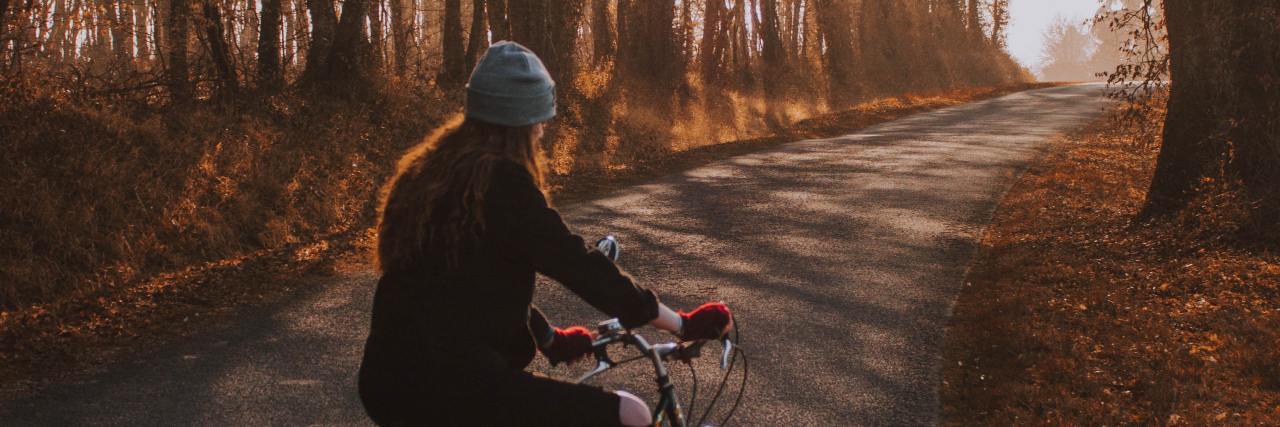I found myself this week up all night, sobbing, struggling to get my heart rate under control. An endless stream of thoughts was racing through my mind. I knew I needed to eat but I was so nauseous that the thought of trying to keep anything down seemed impossible. These are the physical manifestations of my anxiety disorder.
I was diagnosed with generalized anxiety disorder (GAD) in the summer of 2016. Looking back now, I know that I had experienced symptoms of anxiety for years, but I didn’t identify these physical symptoms at the time as having anything to do with my mental health. You see, I was “the strong one.” I had to help keep my family together. When you have a sibling with significant health challenges, including schizophrenia, your own challenges tend to pale in comparison. It’s not that bad, you tell yourself. Everyone feels this way, you might think.
And it’s true — to some degree, everyone experiences anxiety. As I was learning at the time while I was earning my degree in psychology, anxiety is an adaptive feeling. It’s meant to keep us safe — to help us sense danger and fight, flight or freeze in the face of threats. Anxiety, in many circumstances, is “normal” and expected.
What isn’t normal or expected is to feel anxious more often than not. When anxiety starts to impact your everyday life and relationships, it is no longer adaptive and can become incredibly debilitating and lonely. I don’t think the loneliness of having an anxiety disorder is talked about enough.
After I was diagnosed in 2016, I took anti-anxiety medication for a short time and eventually moved onto other self-management methods. I became more open with my loved ones about how I was doing and the things that made me anxious. I reflected on my triggers and the thought patterns I had that were anxiety-fueled. I talked to therapists and counselors. And for a long time, I thrived. I still had challenges and occasional anxiety attacks, but I worked through them and understood them better. I finished my undergraduate degree, got into graduate school and fulfilled a lifelong dream of moving to the West Coast. Through all of this, I thought that my anxiety would never get as bad as it had again when I had hit my breaking point all those years ago. I had conquered the worst of it.
And then the whole world changed, seemingly overnight, in March 2020.
Still, I adapted. I moved back home to be closer to my family. I finished my master’s program online and graduated through a YouTube ceremony (I can’t wait to tell my future kids that one day). I was temporarily laid off but rehired, then found a part-time contract in the mental health field, and later another. My partner, our dog and I moved four times between March and December 2020, including packing up everything we owned and driving across Canada during the first wave of the COVID-19 pandemic, but we were finally settled in a place that felt like home. I badly injured my ankle in November and spent nearly two months in a cast, but with time, I healed and recovered. And I looked closely at some of the coping mechanisms and habits that I had developed in the past year and made positive, healthier changes.
And yet, here I found myself last week, feeling like I was drowning in the anxiety that I had held at bay for the past year. I had felt it coming on physically, just like last time, but wrote it off or normalized it. I didn’t want to open the door to anxiety again, even as I felt it inching its way back into my body and my mind. Because admitting it would mean that I hadn’t been able to do what I thought I had and conquer the worst of it. I never wanted to feel that low again and yet, here I was, once again in the depths.
When my partner finally helped me come to terms with what was going on, I felt really sad. I was sad to be back here again. As much as I tried not to blame myself, I felt like I had somehow let myself down.
But I also know that this time is different and that I can handle it, because I’ve handled it before. And while it’s a lonely, sad place to be, I know that I am not alone. My partner reminded me that it’s like riding a bicycle — when you’re just learning, sometimes you fall off, and it really hurts. But you try again, and you get better, and you keep moving. And it’s OK — even expected — to fall every now and then.
So to anyone else who has fallen off their bike, who is struggling with their mental health, and feels alone — I believe in you and your strength to keep moving forward. Take it slow and take the scenic route. Do all the small things you need to do right now to take care of yourself. Ask for help, because you do not need to carry this weight by yourself. And know that you are not alone on this bumpy, messy ride.
Photo by Mathias P.R. Reding on Unsplash

